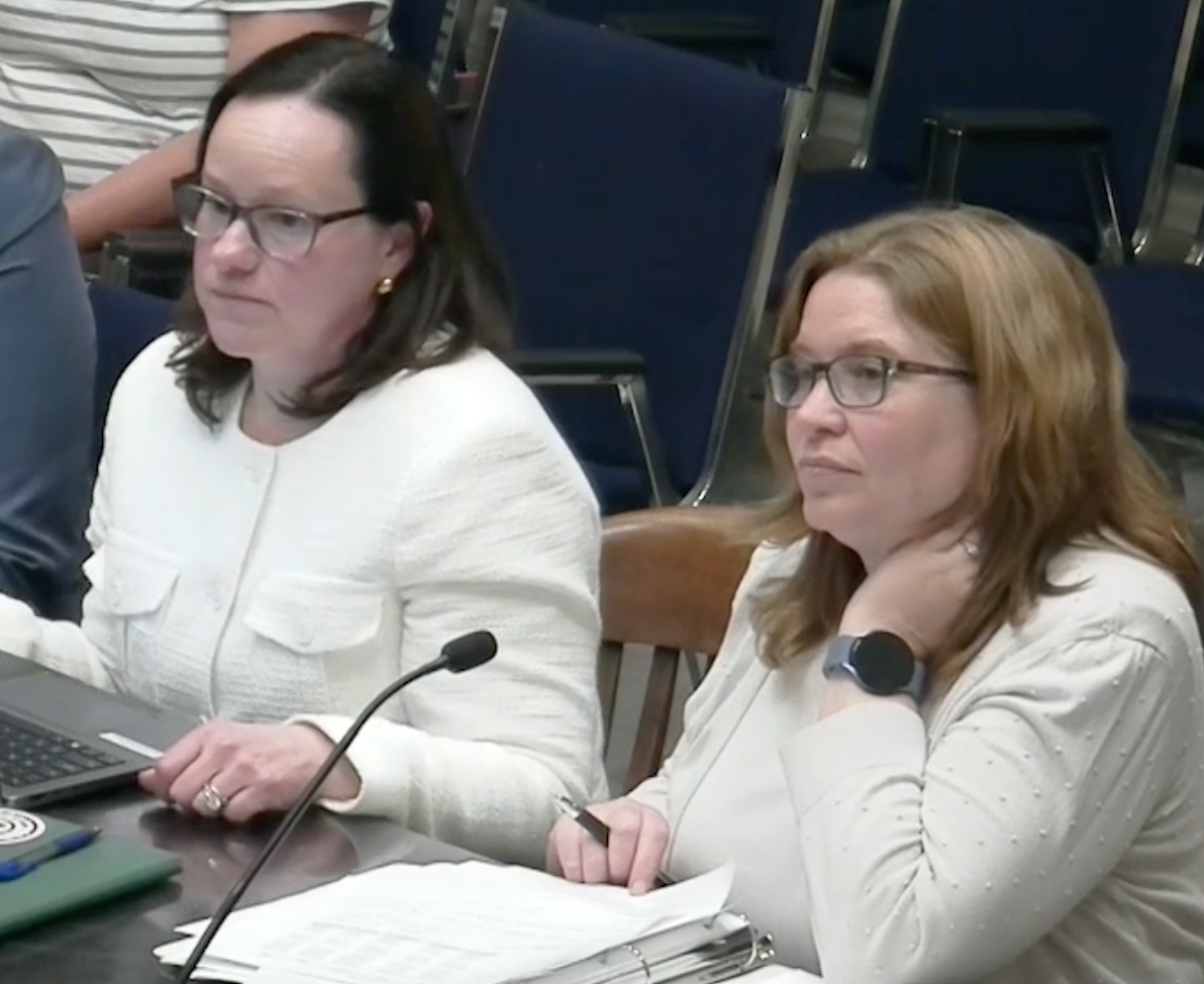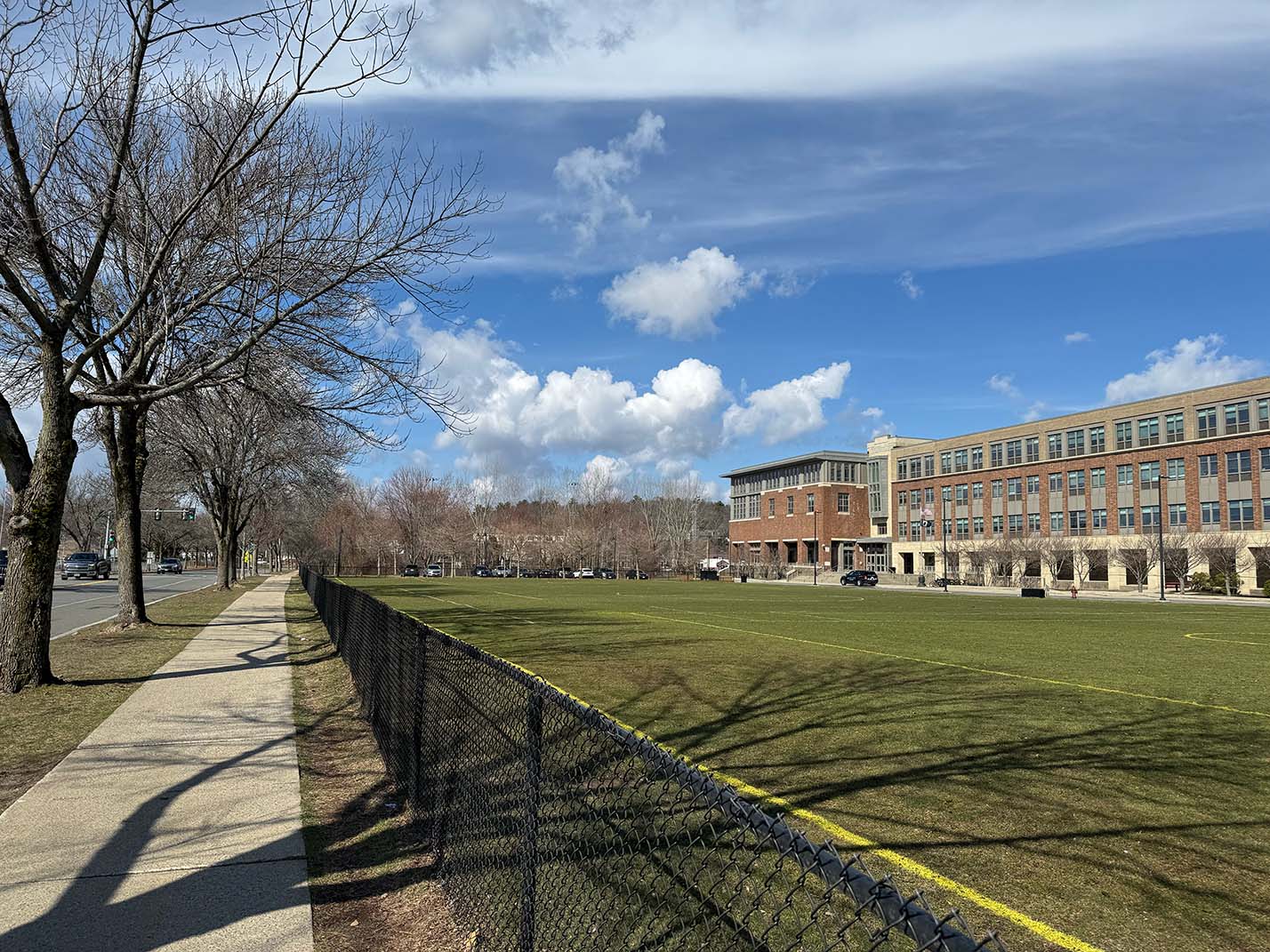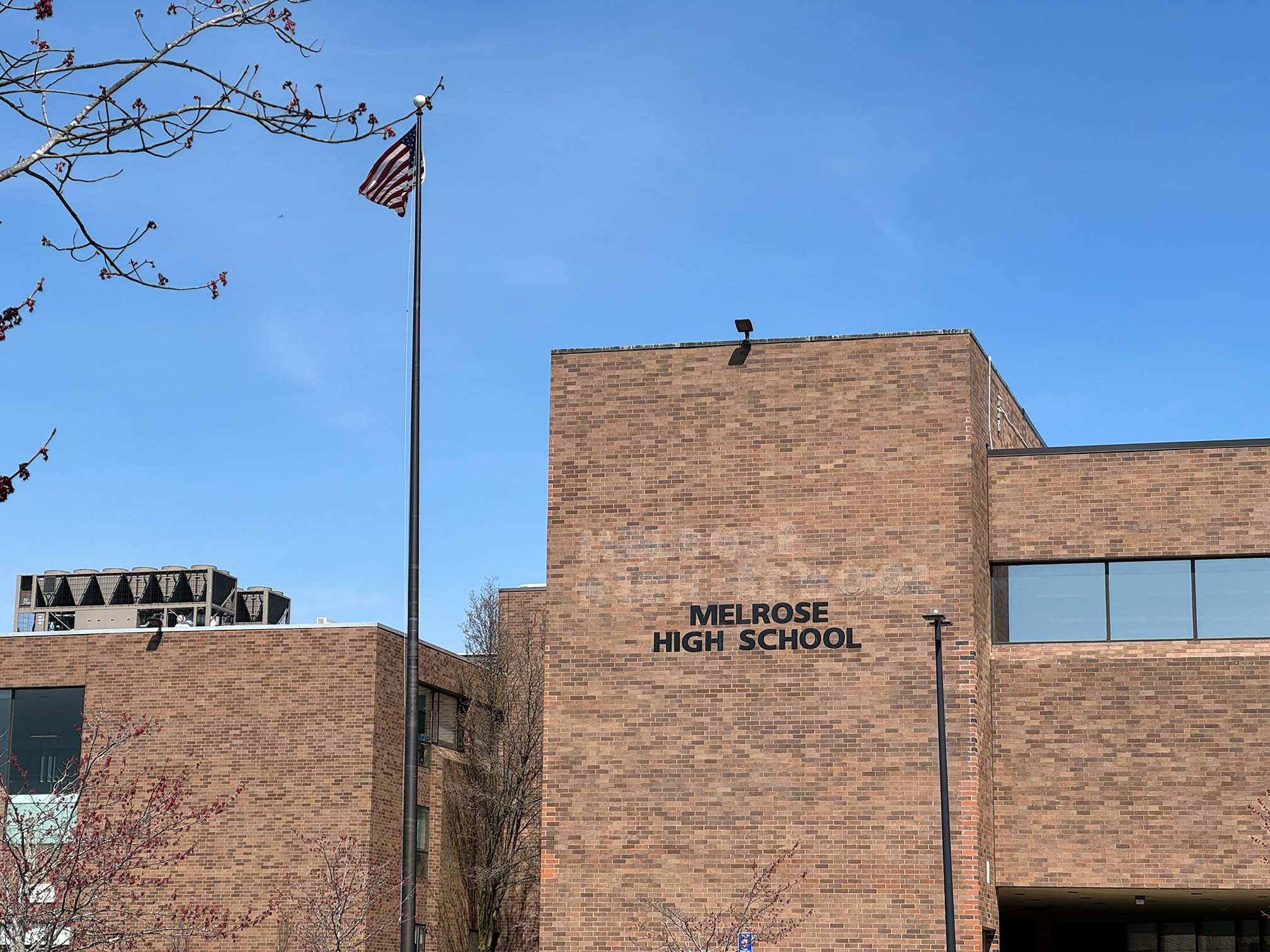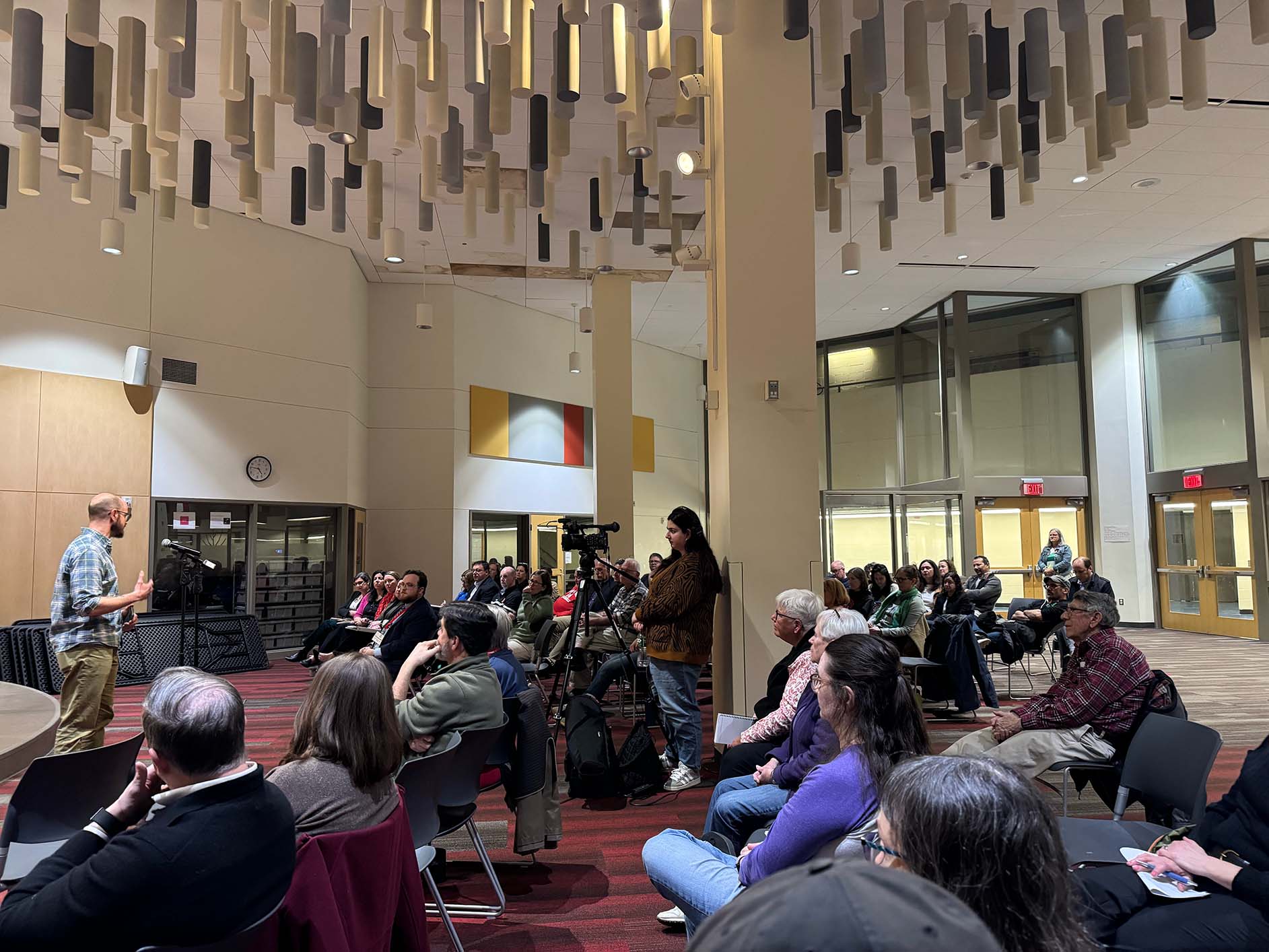The Melrose Messenger
Keeping Melrosians Informed Since 2024
Fiscal Year 2026 Budget
Public Works To See Cuts in Next Year’s Budget
June 1st, 2025

Last week, the Appropriations and Oversight Committee of the City Council heard from the Department of Public Works (DPW) about its budget for Fiscal Year 2026 (FY26), which begins in July, including planned service cuts within the department.
The DPW, which makes up 8.4% of the city’s overall budget, serves a number of functions: custodial and maintenance work for all municipal buildings, including the schools; administering contracts and billing for trash, recycling, water, and sewer; maintaining the city’s roads, parks and the Wyoming Cemetery; maintaining most of the city’s fleet of vehicles; and administering capital projects.
Read More
Mayor Asks City Council to Approve November Override Vote
May 28th, 2025

At Tuesday’s meeting of the Appropriations and Oversight Committee of the City Council, Mayor Jen Grigoraitis presented a proposal for three property tax override questions to be placed on the ballot in November.
These three questions will be tiered - an unusual form of override question where voters can select from different override amounts, with the highest winning amount, if any, going into effect - and offer a potential override of $9.3 million, $11.9 million, or $13.5 million. All of the potential override amounts would stabilize city finances at next year's levels through 2029, and the higher levels could reverse some cuts to city services and the Melrose Public Schools (MPS).
Read More
City Council Hears From First Round of Departments On Next Year’s Budget
May 20th, 2025

Over the last two weeks, as part of their budget process, the Appropriations and Oversight Committee of the City Council has heard from Mayor Jen Grigoraitis and several department heads about their planned budgets for Fiscal Year 2026 (FY26), which starts in July.
The City Council’s role in the budget process is to approve, reject, or reduce a department’s budget; they cannot add or rebalance budget lines. The Appropriations Committee will continue to hold budget hearings twice a week through the second week of June, at which point the City Council will vote on next year’s budget as a whole.
Of the departments that have been presented so far, the Veterans’ Services office will see the largest total budget cuts, largely due to restructuring within the office.
Read More
City Council Begins Budget Process
May 7th, 2025

On Monday evening, the City Council began their role in the process of approving the city’s budget for Fiscal Year 2026 (FY26), which begins in July.
Mayor Jen Grigoraitis kicked off the process by addressing a joint session of the City Council and School Committee to outline her proposal for next year's budget, which will be $107.5 million in total.
Starting on Thursday, the Appropriations and Oversight Committee of the City Council will meet twice a week to hear from and approve, reject, or reduce the proposed budget for each city department, until the City Council votes on the budget as a whole at the end of May.
Read More
School Committee Clashes Over Budget Vote
April 18th, 2025

After heated discussion on Tuesday night, the School Committee voted on a $47.65 million budget for the Melrose Public Schools (MPS) for Fiscal Year 2026 (FY26), which begins in July.
This week’s budget deliberations began with a proposal from School Committee Chair Dorie Withey and Vice Chair Jen McAndrew to move a total of $270,000 out of the Administration/Systemwide and Teaching and Learning categories into the Elementary and middle school categories.
“In my opinion,” explained McAndrew, “every one of these categories is too low for Melrose to function as a school district. But we believe that there will be a need for additional positions at the middle school or secondary level, I do not know how those buildings will run without additional positions. And I’m increasingly worried, based on input we’ve received here and from educators and others in the community, that we’re not appropriately resourcing the youngest grades, either.”
Read More
School Committee Discusses Impact of Budget Cuts on Middle and High School
April 10th, 2025

The School Committee heard from Melrose High School (MHS) Principal Jason Merrill and Assistant Principals Christopher Beaver and Bryan Corrigan about the Secondary Program of Studies and how budget cuts for Fiscal Year 2026 (FY26), which starts in July, are likely to impact students at MHS and at Melrose Veterans Memorial Middle School (MVMMS).
MPS is making $4 million in cuts to close that budget gap, which will include cutting fifteen teacher positions at MVMMS and eight at MHS. In addition, the middle school principal position will be eliminated and Merrill will become the principal of both schools, with four assistant principals to support him at the two schools.
“We’ve gotten a lot of emails about this,” said School Committee member Jennifer Razi-Thomas. “All of us in the community and all the educators are wondering: how can you pull the rabbit out of the hat, Mr. Merrill, and make lemonade out of lemons? What’s your best shot for a good year for everybody?”
Read More
Financial Task Force Hears Resident Opinions on Potential Override Vote
March 31st, 2025

The city’s Financial Task Force hosted a Public Budget Forum where residents could share their opinions about what they believe the city should prioritize in its spending, and on potential override questions the city might put on the ballot in November.
“We are facing considerable financial pressures,” Mayor Grigoraitis said at the start of the town hall meeting. “because our fixed costs consistently outpace our revenue growth.”
“I want to be very clear,” she continued, “Melrose will incur significant cuts to our budget for FY26. There is no way out of these cuts because cities in Massachusetts are required by state law to pass balanced budgets, and last year’s override vote failed. We are doing everything we can to mitigate some of the pain for next year through creative budgeting. We are not alone in these circumstances, if that helps: these are deep-seated, structural budget challenges.”
Read More
School Committee Dives Deeper into Budget Details for Next Year
March 28th, 2025

The School Committee examined in more detail this week several aspects of the proposed budget for Fiscal Year 2026 (FY26), which begins in July.
One of the most surprising cuts to come out of this budget cycle is the elimination of the middle school principal position - a decision that Superintendent Adam Deleidi explained in more detail this week.
Members of the public commented at the meeting that the decision was “shocking” and “devastating” and that the situation at the middle and high schools would be “unsustainable - this is more than about education, this is about safety.”
“The middle school principal was among the last cuts we made,” Deleidi explained, “but we have a very talented high school principal who I believe has the capacity to run both schools. Saugus and Watertown both run on the same model. It’s putting a lot of faith in Mr Merrill, but I believe that, if there’s one person who can do this, it would be him.”
Read More
Mayor Discusses Potential Impact of Federal Funding on Melrose
March 21st, 2025

On Tuesday, Mayor Jen Grigoraitis, along with other mayors and town administrators from the Metropolitan Area Planning Council Metro Mayors Coalition, met at the Massachusetts State House with House Ways and Means Chairman Aaron Michlewitz to discuss how changes to federal funding over the next months and years could impact cities and towns across the state.
There has been uncertainty over whether cities like Melrose will receive anticipated federal funds since President Donald Trump’s administration ordered a freeze on many federal grants in January, an order which is currently blocked by the courts. And a number of potential cuts to federal agencies and programs, including the Department of Education and Medicaid, could have significant impacts at the state and local levels.
Read More
Mayor Aims To “Pull Every Lever” To Lessen Cuts For Schools and City
March 13th, 2025

In their most recent meetings, the City Council and the School Committee each received updates from Mayor Jen Grigoraitis on the process of setting the city’s budget for Fiscal Year 2026 (FY26), which begins in July.
It was initially announced that the MPS deficit would be $4.2 million and the remaining deficit on the city side of the budget would be $1.9 million. However, the mayor announced this week, “Given how little is left that can feasibly be reduced from the school budget, please be aware that I have informed the Superintendent that no further cuts are needed; the City will absorb the remaining shortfall on its side of the ledger.”
Read More
School Committee Looks At Budget Cuts For Public Schools
February 27th, 2025

On Tuesday evening, the School Committee met to hear from Superintendent Adam Deleidi about proposed budget cuts to balance a $4.2 million budget deficit in the Melrose Public Schools budget for Fiscal Year 2026, which begins in July.
Superintendent Deleidi explained that his top priority in creating the budget for FY26 was legal compliance with contracts and with state and federal regulations. “As much as I don’t want this to be the top priority,” he explained, “we’re in a situation where we’re in danger of not being compliant with our current budget.” This includes meeting contractual obligations to teachers and other staff members; providing services legally mandated by special education plans for students with disabilities; providing transportation for students who legally require it; and meeting a minimum school spending level dictated by the state Department of Elementary and Secondary Education.
Read More
City and Schools Facing Millions in Budget Cuts for Next Year
February 6th, 2025

Last night, the City Council and the School Committee held a joint meeting to hear about the status of the budget for the City of Melrose and Melrose Public Schools (MPS) for the remainder of Fiscal Year 2025 (FY25) and what the budget process will look like for FY26, which starts in July. Speaking to the full City Council and School Committee as well as a packed audience in the City Council Chamber, Mayor Jen Grigoraitis, Superintendent Adam Deleidi, and other officials discussed prospective budget cuts.
Based on rising costs in a number of areas and limits on the amount the City is able to raise in taxes, MPS will need to make $4.2 million in cuts relative to this year’s services, while the City will need to make $1.9 million in cuts, for a total of $6.1 million, which is almost 6% of this year’s total budget of $104 million.
Read More
School Committee and Teachers Union Agree to One-Year Contract Extension in Anticipation of Challenging Budget Season
January 30th, 2025

On Tuesday night, the School Committee announced that they had come to an agreement with the Melrose Educators Union (MEU) to extend the current Unit A and Unit C contracts to June 2026. The School Committee agreed to “market adjustments” for teachers and paraprofessionals within the current pay scale, but no other changes were made to the contracts. This agreement comes as the School Committee prepares to start discussing the budget for the Melrose Public Schools (MPS) for Fiscal Year 2026 (FY26), which officials already anticipate will see a number of service cuts relative to this year’s budget.
School Committee Chair Dorie Withey called the agreement an “innovative one-year deal to keep our schools uninterrupted next year in the face of enormous fiscal constraints for our city and our schools.” Melrose’s contracts for teachers and paraprofessionals (Unit A and Unit C, respectively) had been set to expire this June. The extension provides educators in these groups with a pay raise, although Melrose teachers are still paid less on average than educators in a number of surrounding districts.

Follow Us: